|
|
|
Sort Order |
|
|
|
Items / Page
|
|
|
|
|
|
|
| Srl | Item |
| 1 |
ID:
141545
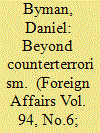

|
|
|
|
|
| Summary/Abstract |
When the Obama administration looks at the Middle East [2], it does so through the lens of counterterrorism. A systematic emphasis on the subject has underscored not just the administration’s relentless pursuit of al Qaeda and its new focus on the self-proclaimed Islamic State [3] (or ISIS) but also a wider swath of its foreign policy, from its drone campaign in northwestern Pakistan to its maintenance of the detention facility in Guantánamo Bay.
|
|
|
|
|
|
|
|
|
|
|
|
|
|
|
|
| 2 |
ID:
141551


|
|
|
|
|
| Summary/Abstract |
The events of the past five years have put an intense strain [1] on the relationship between the United States and its traditional partners in the Arab world, particularly the countries that belong to the Gulf Cooperation Council: Bahrain, Kuwait, Oman, Qatar, Saudi Arabia, and the United Arab Emirates. As popular revolts have flared up across the Middle East, civil wars have broken out, and the regional order has become increasingly vulnerable, leaders in Washington and in Arab capitals have often had starkly different reactions. Meanwhile, most of the GCC countries have watched nervously—and sometimes angrily [2]—as the United States has negotiated with their bitter rival, Iran, over an agreement to limit the Iranian nuclear program.
|
|
|
|
|
|
|
|
|
|
|
|
|
|
|
|
| 3 |
ID:
141562


|
|
|
|
|
| Summary/Abstract |
In February 2015, when U.S. President Barack Obama released his second and final National Security Strategy—a formal outline of the administration’s foreign policy —it was met with the usual fanfare. Critics and defenders debated its principles and priorities. Prospective presidential candidates piggybacked off the release to highlight their own security agendas, hoping to score political points and broadcast their resolve. Others were simply relieved that the president, who often seemed allergic to explaining his grand strategy, had given voice to one.
|
|
|
|
|
|
|
|
|
|
|
|
|
|
|
|
| 4 |
ID:
141550
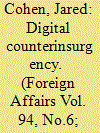

|
|
|
|
|
| Summary/Abstract |
The Islamic State, or ISIS, is the first terrorist group to hold both physical and digital territory : in addition to the swaths of land it controls in Iraq and Syria, it dominates pockets of the Internet with relative impunity. But it will hardly be the last. Although there are still some fringe terrorist groups in the western Sahel or other rural areas that do not supplement their violence digitally, it is only a matter of time before they also go online. In fact, the next prominent terrorist organization will be more likely to have extensive digital operations than control physical ground.
|
|
|
|
|
|
|
|
|
|
|
|
|
|
|
|
| 5 |
ID:
141542
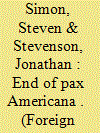

|
|
|
|
|
| Summary/Abstract |
STEVEN SIMON is a Visiting Lecturer at Dartmouth College and served as Senior Director for Middle Eastern and North African Affairs at the White House from 2011 through 2012. JONATHAN STEVENSON is Professor of Strategic Studies at the U.S. Naval War College and served as Director for Political-Military Affairs for the Middle East and North Africa on the U.S. National Security Council staff from 2011 to 2013.
|
|
|
|
|
|
|
|
|
|
|
|
|
|
|
|
| 6 |
ID:
141563
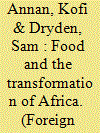

|
|
|
|
|
| Summary/Abstract |
In recent years, African agricultural policies have been haphazard and inconsistent. Some countries have neglected smallholders in favor of commercial farmers. Others have given them attention but focused narrowly on increasing their productivity. African farms’ harvests are indeed much smaller than harvests elsewhere, so increasing productivity is important. But agriculture is about more than yields. A vast food system spreads beyond farm and table to touch almost every aspect of life in every society. Making that system in Africa as robust as possible will not merely prevent starvation. It will also fight poverty, disease, and malnutrition; create businesses and jobs; and boost the continent’s economies and improve its trade balances .
|
|
|
|
|
|
|
|
|
|
|
|
|
|
|
|
| 7 |
ID:
141552


|
|
|
|
|
| Summary/Abstract |
For decades, the partnership between Egypt and the United States was a linchpin of the American role in the Middle East. Today, it is a mere vestige of a bygone era. There are no longer any compelling reasons for Washington to sustain especially close ties with Cairo. What was once a powerfully symbolic alliance with clear advantages for both sides has become a nakedly transactional relationship—and one that benefits the Egyptians more than the Americans. The time has come for both sides to recognize that reality and for the United States to fundamentally alter its approach to Egypt: downgrading the priority it places on the relationship, reducing the level of economic and military support it offers Cairo, and more closely tying the aid it does deliver to political, military, and economic reforms that would make Egypt a more credible partner.
|
|
|
|
|
|
|
|
|
|
|
|
|
|
|
|
| 8 |
ID:
141559
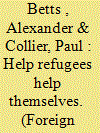

|
|
|
|
|
| Summary/Abstract |
There are now some 60 million displaced people around the world, more than at any time since World War II. The Syrian crisis alone, which has created the largest refugee shock of the era, has displaced some ten million people, around four million of them across international borders. In recent months, Western attention has focused almost exclusively on the flood of these refugees to Europe. Yet most of the Syrian refugees have been taken in not by Western countries but by Syria’s neighboring states: Jordan, Lebanon, and Turkey, whose capacity has been overwhelmed. Lebanon, with a population of around four million and a territory smaller than Maryland, is hosting over a million Syrian refugees. Young people are overrepresented in the refugee population, so that more than half of the school-aged children in Lebanon are now Syrian.
|
|
|
|
|
|
|
|
|
|
|
|
|
|
|
|
| 9 |
ID:
141546
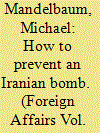

|
|
|
|
|
| Summary/Abstract |
The Joint Comprehensive Plan of Action (JCPOA), reached by Iran, six other countries, and the European Union in Vienna in July, has sparked a heated political debate in the United States. Under the terms of the agreement, Iran has agreed to accept some temporary limits on its nuclear program in return for the lifting of the economic sanctions the international community imposed in response to that program. The Obama administration, a chief negotiator of the accord, argues that the deal will freeze and in some ways set back Iran’s march toward nuclear weapons while opening up the possibility of improving relations between the United States and the Islamic Republic, which have been bitterly hostile ever since the 1979 Iranian Revolution. The administration further contends that the agreement includes robust provisions for the international inspection of Iran’s nuclear facilities that will discourage and, if necessary, detect any Iranian cheating, triggering stiff penalties in response.
|
|
|
|
|
|
|
|
|
|
|
|
|
|
|
|
| 10 |
ID:
141548


|
|
|
|
|
| Summary/Abstract |
American leaders contemplating Iraq have made a habit of substituting unpleasant realities with rosy assessments based on questionable assumptions. In 1991, after the Gulf War, the George H. W. Bush administration hoped that Iraqis would rise up against Saddam Hussein and encouraged them to do so, only to abandon them to the Republican Guard. In 1998, President Bill Clinton signed the Iraq Liberation Act, officially embracing regime change and transferring millions of dollars to an Iranian-backed convicted embezzler, Ahmed Chalabi. In 2003, the George W. Bush administration assumed that toppling Saddam would lead to stability rather than chaos when the U.S. military “shocked and awed” its way to Baghdad. In 2005, as the country descended into violence, Vice President Dick Cheney insisted that the insurgency was in its “last throes.”
|
|
|
|
|
|
|
|
|
|
|
|
|
|
|
|
| 11 |
ID:
141549
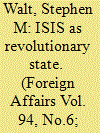

|
|
|
|
|
| Summary/Abstract |
ISIS, seems uniquely baffling and unusually dangerous . According to its leaders’ own statements, the group wants to eliminate infidels, impose sharia worldwide, and hasten the arrival of the Mahdi. ISIS' foot soldiers have pursued these goals with astonishing cruelty. Yet unlike the original al Qaeda, which showed little interest in controlling territory, ISIS has also sought to build the rudiments of a genuine state in the territory it controls. It has established clear lines of authority, tax and educational systems, and a sophisticated propaganda operation. It may call itself a “caliphate” and reject the current state-based international system, but a territorial state is what its leaders are running. As Jürgen Todenhöfer, a German journalist who visited territory in Iraq and Syria controlled by ISIS, said in 2014, “We have to understand that ISIS is a country now .”
|
|
|
|
|
|
|
|
|
|
|
|
|
|
|
|
| 12 |
ID:
141560
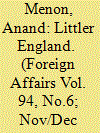

|
|
|
|
|
| Summary/Abstract |
In the last year, some 39,000 migrants , mostly from North Africa, tried to make their way to the United Kingdom from the French port of Calais by boarding trucks and trains crossing the English Channel. In response, the British government attempted to secure the entrance to the tunnel in Calais , dispatching two and a half miles of security fencing that had been used for the 2012 Olympics and the 2014 NATO summit.
|
|
|
|
|
|
|
|
|
|
|
|
|
|
|
|
| 13 |
ID:
141561


|
|
|
|
|
| Summary/Abstract |
When the Berlin-based group Transparency International released its annual ranking of international corruption levels in December 2014, China’s Ministry of Foreign Affairs responded with a blistering statement. Chinese authorities were upset that their country had sunk from 80th to 100th place on the watchdog’s influential Corruption Perceptions Index, even though Beijing was pursuing a high-profile anticorruption campaign . “As a fairly influential international organization,” a Chinese Foreign Ministry spokesperson said , “Transparency International should seriously examine the objectiveness and impartiality of its Corruption Perceptions Index.”
|
|
|
|
|
|
|
|
|
|
|
|
|
|
|
|
| 14 |
ID:
141553
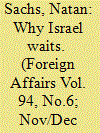

|
|
|
|
|
| Summary/Abstract |
Israeli national security strategy can seem baffling. Many observers in the United States and Europe, for example, wonder how Israeli Prime Minister Benjamin Netanyahu could have warned for years that Iran’s nuclear program posed an existential threat to Israel yet has balked at the international community’s attempts to defang it. By raising concerns about the nuclear deal between Iran and five great powers without offering a convincing alternative, Netanyahu has appeared to oppose any solution at all. Instead, as Philip Hammond, the British foreign secretary, said in July, Netanyahu is acting as though he would prefer a “permanent state of standoff” with Tehran.
|
|
|
|
|
|
|
|
|
|
|
|
|
|
|
|
| 15 |
ID:
141558
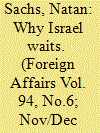

|
|
|
|
|
| Summary/Abstract |
Israeli national security strategy can seem baffling. Many observers in the United States and Europe, for example, wonder how Israeli Prime Minister Benjamin Netanyahu could have warned for years that Iran’s nuclear program posed an existential threat to Israel yet has balked at the international community’s attempts to defang it. By raising concerns about the nuclear deal between Iran and five great powers without offering a convincing alternative, Netanyahu has appeared to oppose any solution at all. Instead, as Philip Hammond, the British foreign secretary, said in July, Netanyahu is acting as though he would prefer a “permanent state of standoff” with Tehran.
|
|
|
|
|
|
|
|
|
|
|
|
|
|
|
|
| 16 |
ID:
141547


|
|
|
|
|
| Summary/Abstract |
Over the past few years, the nuclear issue [1] has dominated news about Iran. The landmark deal [2] recently agreed to between Iran and the United States and other world powers sets out arrangements for handling that issue, but it leaves open many other questions about Iran’s future course. One of the most fundamental questions is what path Iran will follow after the sanctions have been lifted: Will it open itself up to the world, fulfilling the country’s economic potential [3], or will the country’s influential conservative elite thwart global engagement? Iran’s choice will have profound geopolitical implications and will shape the country’s role in the world over the coming decades.
|
|
|
|
|
|
|
|
|
|
|
|
|
|
|
|
|
|
|
|
|